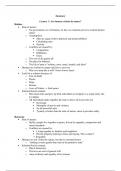Samenvatting
Summary Philosophy (and Ethics) of Political Violence
- Vak
- (S_PEV)
- Instelling
- Vrije Universiteit Amsterdam (VU)
Summary of the Philosophy part of the course Philosophy and Ethics of Political Violence of the minor: Peace and Conflict Studies (midterm). Grade: 8.2 Summary of the literature + presentations.
[Meer zien]




